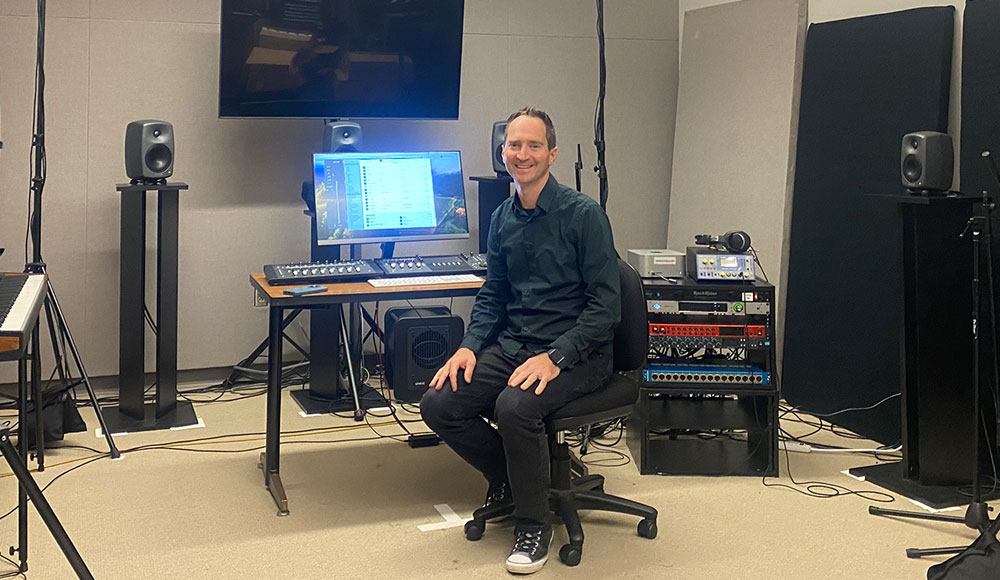Pink Floyd’s 1972 hit “Money” runs through the studio speakers as I take in the first few bars of cash-related sound effects while seated in Cabrillo College’s immersive audio lab. There’s the swishing sound of tearing paper to my middle right, a single guitar riff beams out from the lower left side of the room, coins jingle in the high right corner, as Dave Gilmour’s lead vocals flow out from the center of the room, floating up over my head. It feels like I’m on stage in the middle of Pink Floyd. I’m in the band.
Boasting state-of-the-art technology, featuring a 7.1.4 Dolby Atmos mixing and production space with Genelec SAM monitors, this immersive audio lab came to life in 2023, allowing students to learn cutting-edge skills being used today in music and audio for film, podcasts, video games and other audio careers. These new technologies are revolutionizing sound design by creating a more realistic feeling of the sound source. Cabrillo is one of the only community colleges in the nation to have this equipment.
According to Jean-Marc Jot, an expert in the evolution of audio technology who is on the Industry Advisory Board of Cabrillo College’s Music Technology and Recording Arts (MTRA) program, in the near future “we will expect to be able to move around in a scene, like you would in a video game. If the audio is not immersive, the experience will not be realistic or convincing.”
No longer confined to mixing audio on two speakers, artists can use these new spatial audio technologies to place individual sounds in a three-dimensional space, creating an immersive experience where sound can come from anywhere, as in real life.
Along with the new studio, the college has partnered with Universal Audio to upgrade the equipment—including microphones, audio interfaces and plug-ins. “The system has been integrated into most DAWs [digital audio workstations] like Logic, or Ableton,” says Matt Blostein, co-chair of Cabrillo’s Music Department and director of the MTRA program. Students following courses through the MTRA will be learning audio skills in a professional studio environment. What’s more, these new technologies are adaptable for any playback system, be it headphones or a soundbar.
Who are the music production classes for? Anyone from beginners curious about learning how to create a beat to more evolved students who may already have experience in home studios and working professionally. “I had been doing some stuff in home studios before studying here and I wanted to supplement my knowledge and get a deeper understanding of things. I’ve worked on some other people’s professional albums, assisting as an engineer. I spent four hours doing vocal editing last night,” says Summer Russell. At 42, Russell is working toward the AS degree as a continuing student. “It’s a really broad basis of knowledge.”
The program aims to prepare students for careers in sound design, music composition, audio engineering, live sound engineering, music production or even film scoring. Cabrillo offers three music technology certificates and an associate’s degree, with most courses lasting eight weeks. An internship is required to get the degree. “The way we designed it,” Blostein explains, “is that as students take classes, they can stack their certificates, as they work toward their degree.” And they come out armed with the proper exposure and tools to be a part of creating the sound of the future in audio.
“It opened me up to a whole new world,” says 21-year old music student Preston Skiscim, on experiencing the new immersive lab. “It was my first exposure of being in an acoustic surround sound space outside of the movie theatre. Having this experience is sort of an ace up my sleeve. You get a lot of tools in your tool belt,” he proclaims enthusiastically. Skiscim is aiming to obtain an associate’s degree in Music Technology by the end of the school year. “I feel like this program has so many different fields to explore. It’s quite impressive. To be well versed in all of that is a serious undertaking,” Skiscim says.
The sonic upgrade to Cabrillo College’s Studio B came in 2022 with the aid of a faculty grant to Blostein, who took over the Music Technology & Recording Arts program from his predecessor, James Durland, in 2019. A professional jazz musician as well as a teacher, Blostein continues to keep his head in the game professionally, composing music for the last World Cup, the Super Bowl, reality TV and Nickelodeon, or writing music for the gaming world.
Another way to explore ideas and gain knowledge through collaboration is to join the MTRAK—a music club open to any Cabrillo student. Meeting weekly, the club offers students the opportunity to connect with like-minded music heads. Getting feedback on personal projects, touring studios with the group, or even attending music technology conferences are some of the opportunities.
“Learning about people’s different processes is interesting,” says student Cedar Hopewell, who is in the music club. “Someone may have a unique way of using hardware, like a reel-to-reel, or a 404.” At the ripe age of 18, he is following the AS degree curriculum. “I’m here for the recording arts side, like sound engineering. I want to do it professionally—maybe one day open my own studio.”
This article was published in the 2025 Student Guide, an insert in the Sept. 24 issue of Good Times. Click here to see the entire guide.











